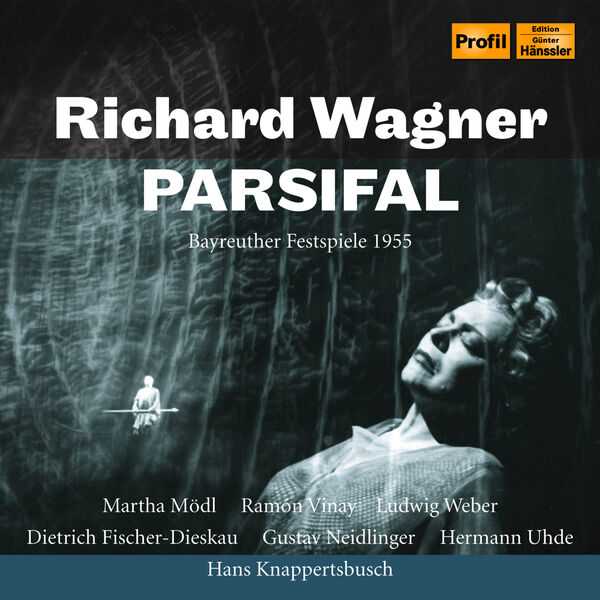
Composer: Richard Wagner
Performer: Dietrich Fischer-Dieskau, Hermann Uhde, Ludwig Weber, Ramón Vinay, Gustav Neidlinger, Martha Mödl, Josef Traxel, Alfons Herwig, Paula Lenchner, Elisabeth Schärtel, Gerhard Stolze, Alfred Pfeifle, Ilse Hollweg, Friedl Pöltinger, Dorothea Siebert, Jutta Vulpius, Bayreuth Festival Choir
Orchestra: Bayreuth Festival Orchestra
Conductor: Hans Knappertsbusch
Format: FLAC (tracks)
Label: Profil Medien
Catalogue: PH23002
Release: 2023
Size: 1.1 GB
Recovery: +3%
Scan: yes
Wagner: Parsifal, WWV 111 (Live)
Act I
01. Vorspiel
02. Scene 1: He! Ho! Waldhüter ihr
03. Scene 1: Seht dort die wilde Reiterin!
04. Scene 1: Recht so! Habt Dank! Ein wenig Rast
05. Scene 1: Nicht Dank! Ha, ha! Was wird es helfen?
06. Scene 1: Oh, wunden-wundervoller heiliger Speer!
07. Scene 1: Titurel, der fromme Held, der kannt’ ihn wohl
08. Scene 1: Weh’! Weh’! Hoho! Auf! Wer ist der Frevler?
09. Scene 1: Nun sag! Nichts weißt du, was ich dich frage
10. Scene 1: Vom Bade kehrt der König heim
11. Scene 1: Verwandlungsmusik
12. Scene 2: Nun achte wohl, und lass mich sehn
13. Scene 2: Mein Sohn Amfortas, bist du am Amt?
14. Scene 2: Wehvolles Erbe, dem ich verfallen
15. Scene 2: Nehmet hin meinen Leib
16. Scene 2: Wein und Brot des letzten Mahles
17. Scene 2: Was stehst du noch da?
Act II
18. Vorspiel
19. Scene 1: Die Zeit ist da
20. Scene 1: Ach! Ach! Tiefe Nacht
21. Scene 1: Furchtbare Not!
22. Scene 1: Ho! Ihr Wächter! Ho! Ritter!
23. Scene 2: Hier war das Tosen
24. Scene 2: Komm! Komm! Holder Knabe!
25. Scene 2: Parsifal! Weile!
26. Scene 2: Dies alles hab’ ich nun geträumt?
27. Scene 2: Ich sah das Kind an seiner Mutter Brust
28. Scene 2: Wehe! Wehe! Was tat ich? Wo war ich?
29. Scene 2: Amfortas! Die Wunde! Die Wunde!
30. Scene 2: Gelobter Held! Entflieh dem Wahn!
31. Scene 2: Grausamer! Fühlst du im Herzen nur andrer Schmerzen
32. Scene 2: Auf Ewigkeit wärst du verdammt mit mir
33. Scene 2: Vergeh, unseliges Weib!
Act III
34. Vorspiel
35. Scene 1: Von dorther kam das Stöhnen
36. Scene 1: Wer nahet dort dem heil’gen Quell?
37. Scene 1: Heil mir, dass ich dich wieder finde!
38. Scene 1: O Gnade! Höchstes Heil!
39. Scene 1: Nicht so! Die heil’ge Quelle selbst erquicke unsres Pilgers Bad
40. Scene 1: Gesegnet sei, du Reiner, durch das Reine!
41. Scene 1: Wie dünkt mich doch die Aue heut so schön!
42. Scene 1: Du siehst, das ist nicht so
43. Scene 1: Mittag. Die Stund’ ist da
44. Scene 2: Geleiten wir im bergenden Schrein
45. Scene 2: Ja, Wehe! Wehe! Weh’ über mich!
46. Scene 2: Nur eine Waffe taugt
47. Scene 2: Höchsten Heiles Wunder!
On the 16th of August, 1955, the weather in Berlin was partially overcast with sunny intervals, while in Nuremberg it was cloudy, but in the Bayreuth Festspielhaus those present were celebrating a musical moment of glory. After a brief interlude by Clemens Krauss in 1953, Parsifal was once again being conducted by Hans Knappertsbusch, and as usual, Martha Modi sang Kundry as she had done in every performance since 1951, while Ludwig Weber as usual took the part of Gurnemanz. Gustav Neidlinger had played Klingsor since 1954, Ramon Vinay had sung the title character for the first time in 1953, abandoned it a year later and was now back. A newcomer to the Parsifal ensemble was Dietrich Fischer-Dieskau as Amfortas, who had only taken on the role during that summer in Bayreuth, and in only a single performance on that 16th of August in 1955 did Hermann Uhde sing the part of Titurel. This recording provides a complete documentation of Hans Knappertsbusch’s conducting in Parsifal in Bayreuth. According to Klaus Kalchschmid, his conception of the piece certainly changed over the years: “It moved away from an all too great an emphasis on grandeur towards an aggressive, even vociferous drama.” Each recording is unique, and above all that from 1955, thanks to Modl, Vi nay, Weber and Fischer-Dieskau.